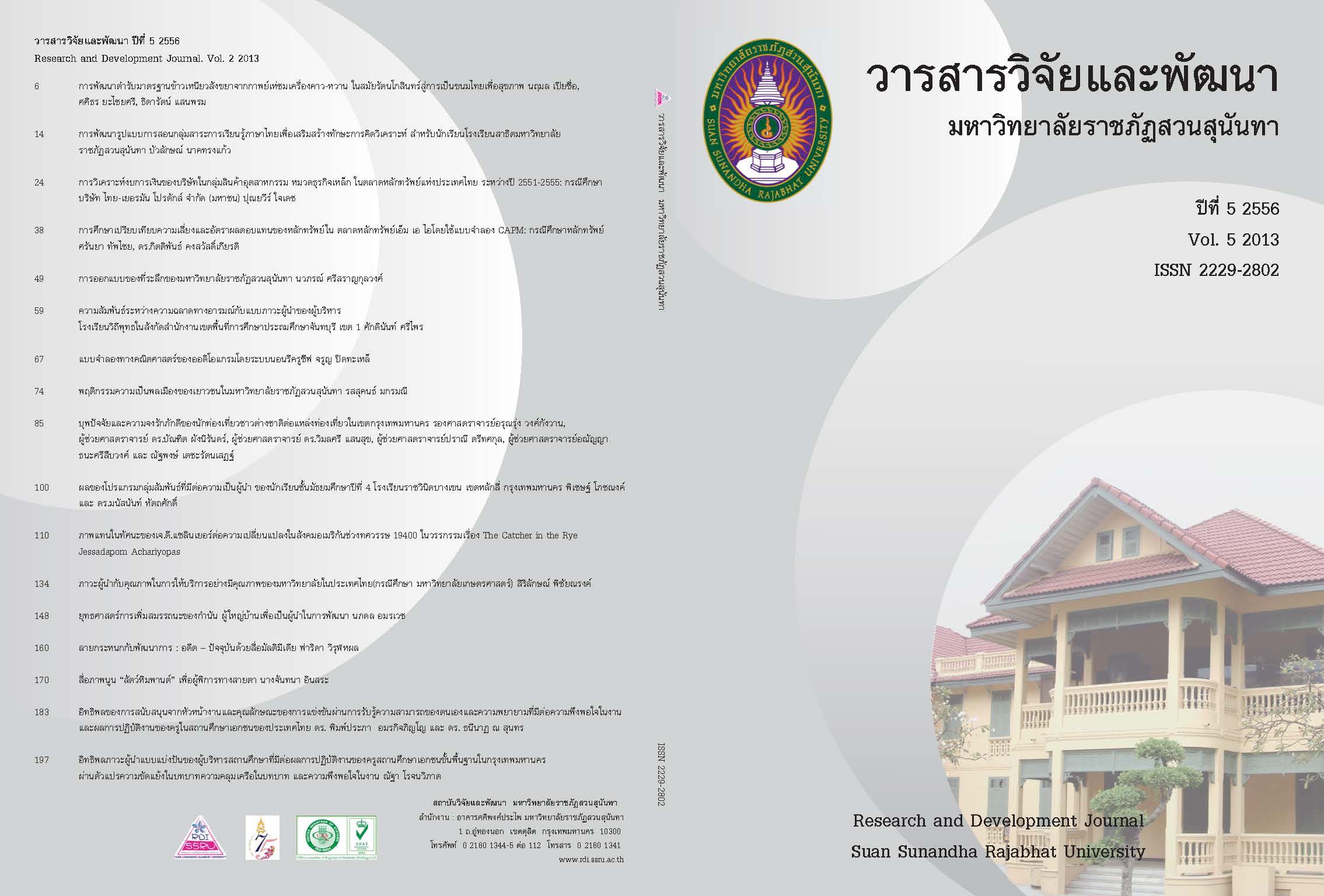พฤติกรรมความเป็นพลเมืองของเยาวชนในมหาวิทยาลัยราชภัฏสวนสุนันทา
DOI:
https://doi.org/10.53848/irdssru.v5i1.214302คำสำคัญ:
ความเป็นพลเมือง พฤติกรรมเยาวชน หน้าที่พลเมือง พลเมืองศึกษาบทคัดย่อ
การวิจัยนี้เป็นการวิจัยเชิงพรรณนา มีวัตถุประสงค์เพื่อศึกษาพฤติกรรมความเป็นพลเมืองของเยาวชนในมหาวิทยาลัยราชภัฏสวนสุนันทา คาถามการวิจัยประกอบด้วย 1) เยาวชนมีพฤติกรรมความเป็นพลเมืองเพียงใด 2) เยาวชนหญิงและเยาวชนชายมีพฤติกรรมความเป็นพลเมืองแตกต่างกันหรือไม่ อย่างไร และ 3) เยาวชนนักเรียนและเยาวชนนักศึกษามีพฤติกรรมความเป็นพลเมืองแตกต่างกันหรือไม่ อย่างไร กลุ่มตัวอย่างประกอบด้วยผู้บริหารที่รับผิดชอบกิจการนักเรียนนักศึกษา 10 คน ผู้นาเยาวชน 90 คน นักศึกษา 480 คน และนักเรียน 89 คน ในภาคเรียนที่ 1 ปีการศึกษา 2554 เครื่องมือวิจัยประกอบด้วยแบบสัมภาษณ์ แบบประเมิน และแบบสอบถาม ข้อมูลที่เก็บรวบรวมได้นามาวิเคราะห์ด้วยสถิติพรรณนาและสถิติอ้างอิง t-test ที่ระดับนัยสาคัญ.05 ผลการวิจัยพบว่า 1) เยาวชนมีพฤติกรรมความเป็นพลเมืองปรากฏเป็นบางครั้ง โดยเรียงลาดับจากมากไปหาน้อยดังนี้คือ เคารพความแตกต่าง เคารพกฎกติกา-เคารพกฎหมาย เคารพสิทธิผู้อื่น รับผิดชอบต่อสังคม เคารพหลักความเสมอภาค มีอิสรภาพ-พึ่งตนเองได้ ทั้งนี้ เยาวชนไม่เคยมีส่วนร่วมทางานในองค์กรเพื่อสังคมอย่างมีนัยสาคัญ 2) เยาวชนหญิงกับเยาวชนชายมีพฤติกรรมความเป็นพลเมืองโดยภาพรวมไม่แตกต่างกัน และไม่มีส่วนร่วมทางานในองค์กรเพื่อสังคมเช่นเดียวกัน อย่างไรก็ตาม เยาวชนหญิงมีพฤติกรรมเคารพกฎกติกา-เคารพกฎหมายมากกว่าเยาวชนชายอย่างมีนัยสาคัญ 3) เยาวชนนักเรียนกับเยาวชนนักศึกษามีพฤติกรรมความเป็นพลเมืองโดยภาพรวมไม่แตกต่างกัน โดยมีปรากฏเป็นบางครั้งเช่นเดียวกัน และไม่มีส่วนร่วมทางานในองค์กรเพื่อสังคมอย่างมีนัยสาคัญเช่นเดียวกัน อย่างไรก็ตาม นักเรียนปรากฏพฤติกรรมที่แสดงว่ามีอิสรภาพ-พึ่งตนเองได้ เคารพกติกา- เคารพกฎหมาย และรับผิดชอบต่อสังคม มากกว่านักศึกษาอย่างมีนัยสาคัญ
เอกสารอ้างอิง
[3] ปริญญา เทวานฤมิตรกุล. 2552. การศึกษาเพื่อสร้าง
พลเมือง (Civic Education): พัฒนาการเมืองไทยโดย
สร้างประชาธิปไตยที่ “คน”. กรุงเทพมหานคร:
มหาวิทยาลัยธรรมศาสตร์.
[4] วรากรณ์ สามโกเศศ. 2554ก (3 มีนาคม). การศึกษา
เพื่อสร้างความเป็นพลเมือง. มติชน. 2554ข (12
เมษายน). การบรรยายในพิธีลงนามบันทึกข้อตกลง
ความร่วมมือในกระบวนการสร้างความเป็นพลเมือง
ระหว่างสถาบันพระปกเกล้า และมหาวิทยาลัยธุรกิจ
บัณฑิตย์.
[5] ศูนย์วิจัยมหาวิทยาลัยกรุงเทพ (กรุงเทพโพลล์). 2553(16 กันยายน). มองการเมืองใหม่ผ่านสายตาเยาวชน.(ออนไลน์). http://research.bu.ac.th. (20 ตุลาคม). จิตสานึกรับผิดชอบของนิสิตนักศึกษาไทยในปัจจุบัน (ออนไลน์). http://research.bu.ac.th/
[6] สมหวัง พิธิยานุวัฒน์. 2548. พลเมืองศึกษาของไทย :
นโยบายและการปฏิบัติในโรงเรียน. จุฬาสัมพันธ์.
48(13). กรุงเทพมหานคร : คณะครุศาสตร์
จุฬาลงกรณ์มหาวิทยาลัย.
[7] สานักงานเลขาธิการสภาการศึกษา. กระทรวงศึกษาธิการ.2554. ยุทธศาสตร์พัฒนาการศึกษาเพื่อสร้างความเป็น
พลเมือง พ.ศ. 2553-2561. กรุงเทพมหานคร: วี.ที.ซี.คอมมิวนิเคชั่น.
[8] Ben-Porath, S. 2006. Citizenship under Fire:
Democratic Education in Times of Conflict.
Princeton, NJ: Princeton University Press.
[9] Cogan, J.J. & Derrocott, R. 2000. Citizenship
for the
21st Century: An International Perspective on
Education. London: Kogan Page.
[10] Schulz, W., Ainley, J., Fraillon, J., Kerr,
D.& Losito, B. 2010. Initial Findings from the
IEA International Civic and Citizenship
Education Study. Amsterdam: MultiCopy
Netherlands.
ดาวน์โหลด
เผยแพร่แล้ว
รูปแบบการอ้างอิง
ฉบับ
ประเภทบทความ
สัญญาอนุญาต
บทความที่ได้รับการตีพิมพ์เป็นลิขสิทธิ์ของ สถาบันวิจัยและพัฒนา มหาวิทยาลัยราชภัฎสวนสุนันทา
ข้อความที่ปรากฏในบทความแต่ละเรื่องในวารสารวิชาการเล่มนี้เป็นความคิดเห็นส่วนตัวของผู้เขียนแต่ละท่านไม่เกี่ยวข้องกับมหาวิทยาลัยราชภัฎสวนสุนันทา และคณาจารย์ท่านอื่นๆในมหาวิทยาลัยฯ แต่อย่างใด ความรับผิดชอบองค์ประกอบทั้งหมดของบทความแต่ละเรื่องเป็นของผู้เขียนแต่ละท่าน หากมีความผิดพลาดใดๆ ผู้เขียนแต่ละท่านจะรับผิดชอบบทความของตนเองแต่ผู้เดียว





